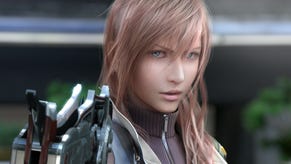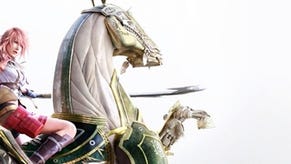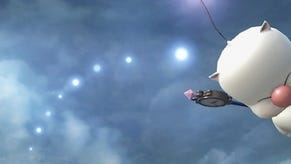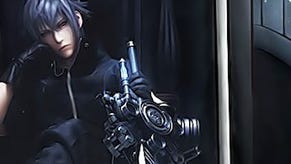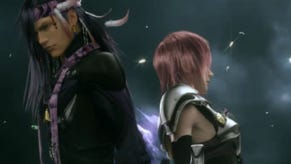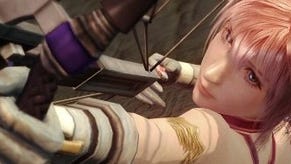Under pressure: is FFXIII-2 a step back from the brink?
Final Fantasy XIII-2 may have topped the UK charts last week, but is it enough to steer Square's flagship back on course? Thankfully, Alex Donaldson reckons the rudder's been turned the right way.
Developed in under two years, XIII-2 is an example of what the team at Square Enix can do if that pressure is in place once more. Playing it, it's clear that there was a sense of urgency and momentum about its development lacking with XIII.
Is Final Fantasy in free-fall? Japanese Media Create figures for the series in recent years are showing a trend likely to worry lovers of the monster franchise – dwindling sales.
Final Fantasy VII sold 2 million units in its first week in Japan, whilst VIII did a little more at 2.5 million. FFX was down with 1.7 million, but X-2 held interest with 1.4 million and XII improved with 1.8 million. Final Fantasy's HD debut, XIII, managed 1.5 millon units in its first week, but XIII-2 sold only 524,000 week-one copies – a fraction of every other entry in the ‘main line’ series.
While it’s dropped in as the UK number one this week, it’s safe to say it's debuted lower than previous games, as it has in Japan.
While those sales are nothing to sniff at - half a million units is something some franchises dream of – Final Fantasy is notorious for long development cycles and expensive CGI. Things need to change. XIII-2 is the game that’s aimed squarely at fixing problems from both a development and gameplay standpoint, making this entry theoretically more cost effective for Square Enix while providing a tighter experience for the player.
And the game itself has been improved. After the meandering, rambling experience of XIII, which took the best part of 20 hours to place all of the gameplay mechanics into your hands, XIII-2 has you doing the most difficult stuff within a few short hours.
The action-packed, exciting-looking battle system from XIII returns with a touch of Pokémon added in the form of a new monster-hunting mechanic. You capture, level and train monsters – most of which were battled in XIII – to become the third member of your party.
It shows Square Enix’s 1st Production Department still has the spark that made it change core mechanics significantly between every FF title in the past.
Go west
The desire to reach back into those higher sales brackets has had some obvious effects on FFXIII-2's structure. The influence of the west is clearest in BioWare-style dialogue branches - or Live Trigger, as it's known here. While not as intricate as the systems in BioWare titles, Live Trigger offers a vague feeling of narrative control over a series which traditionally has been one of the most linear storytellers.
More freedom is offered up by time travel, a clever design decision indeed. Assets are reused throughout as you head to the same areas in different periods, as well as visiting aged sections from XIII, but it also allows the player to hop around at will.
The narrative releases the scruff of your neck and lets you go where you like within the Historia Crux, the game’s time travel hub. While there’s a clear goal in sight you’re free to revisit areas, go back to grind and find more loot, or even cross your own timeline and outright replay an entire story section from earlier. After the "pretty corridor" of Final Fantasy XIII, it’s an impressive amount of freedom.
A plethora of other features, including more control over ally AI, in-battle Quick Time Events, puzzles and a Gold Saucer-like area complete with a casino and Chocobo races, make this a Final Fantasy that has interesting stuff to do outside of the story; and that really was missing from XIII.
Tell me a story: please
It's not all good, however. Final Fantasy XIII-2 packs one of the most mundane, senseless stories I’ve seen in any medium in years, confused into submission by its own time travel mechanics. Luckily, the core RPG is good enough to make it worth sitting through.
This is the crux, really. I have a theory about creative geniuses, visionaries. Square Enix still has many, but I think that given enough time and money even the greatest fail.
Look at Star Wars. Lucas made three fantastic movies under incredible pressure with very little money, but later, given almost limitless funds and technology, his thirst for the perfection of his ever-changing vision poisoned not only the new entries, but contaminated his original masterpieces too.
An example from the music world is Guns n’ Roses. Axl Rose’s Chinese Democracy album is a story of delays to feed a neurotic search for perfection that sounds depressingly similar to Final Fantasy XIII's development. Comparing Final Fantasy to an aging rocker is sad, but apt. Fortunately, Final Fantasy is no longer about one man - especially with Sakaguchi and Uematsu now both detached from the series – and new blood and new attitudes can revitalize its image.
If you want a picture of the future of gaming’s largest Japanese RPG series, Final Fantasy XIII-2 is the game you should be playing. While it’s going to take longer to win those lost sales back, some of the momentum has at least been regained.
The series that had delivered the sprawling VII, VIII and IX in four years took that long just to deliver XIII, the team chopping and changing things in a chaotic search for for the series’s soul. The end result was, of course, a mess.
Developed in under two years, XIII-2 is an example of what the team at Square Enix can do if that pressure is in place once more. Playing it, it's clear that there was a sense of urgency and momentum about its development lacking with XIII.
Some flaws carry over from XIII thanks to the shared world, creative team, engine and assets – but even so this is a better game. ‘Cheap cash in!’ some might cry, seeing asset reused from XIII. All I care about is that the game itself is a marked improvement over its predecessor, and a step in the right direction.
If you want a picture of the future of gaming’s largest Japanese RPG series, Final Fantasy XIII-2 is the game you should be playing. While it’s going to take longer to win those lost sales back, some of the momentum has at least been regained.
Alex Donaldson is editor-in-chief of RPGSite.




